Facebook
Twitter
LinkedIn
Pinterest
Reddit
Email
Print
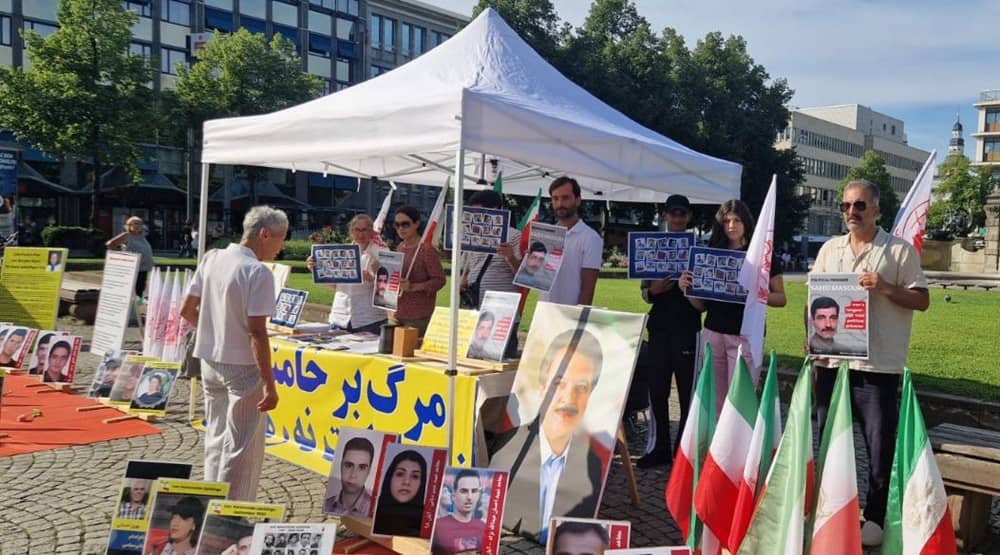 Supporters of the Iranian Resistance in Mannheim, Germany, held a bookstand on July 18, 2025
Supporters of the Iranian Resistance in Mannheim, Germany, held a bookstand on July 18, 2025
THIS PAGE WILL BE UPDATED WITH THE LATEST NEWS
UPDATE: 10:00 AM CEST
Warnings Mount Over New Wave of Executions in Iran – The World Must Act

The international community stands at a critical juncture. The Islamic Republic of Iran is once again invoking the darkest chapters of its history to justify a new wave of political executions. The echoes of the 1988 massacre – when over 30,000 political prisoners (mostly members and supporters of the People’s Mojahedin Organization of Iran-PMOI/MEK) were summarily executed – are no longer distant memories but chilling warnings of what may come.
On 7 July 2025, the IRGC-affiliated Fars News Agency published a brazen editorial titled ‘Why the 1988 Executions Should Be Repeated’. The piece glorified the 1988 massacre as a “successful historical experience” and advocated for its replication against today’s political detainees.
It framed dissent as terrorism and praised the mass killings as a “commendable judicial act”, even invoking religious justifications to normalize state-sponsored murder.
UPDATE: 8:00 AM CEST
Iranian Youth Set Fire to Regime Symbols in Response to Rising Bread Prices
In response to the rising price of bread, the staple food of the Iranian people, rebellious youth across Iran set fire to the posters, billboards, and banners of regime supreme leader Ali Khamenei and his gang of criminals ruling the country. The rebellious youth, saluting the hardworking bakers and the army of the hungry, and emphasizing that the plundered bread and water of the enchained people must be turned into fire to bring down the regime, attacked the symbols of looting and suppression as follows:
Female Relatives of Political Prisoners Subjected to Abusive Searches Before Visits at the Greater Tehran Penitentiary
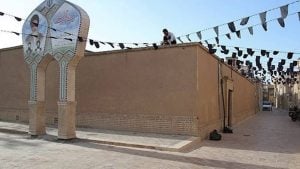
Female relatives of political prisoners held in Greater Tehran Penitentiary (a.k.a. Fashafuyeh) say they are being subjected to “degrading, abusive and unlawful” strip‑searches before visits, prompting collective protests inside the facility.
According to families and inmates who spoke with independent outlets, the victims include mothers, wives, sisters and even under‑age daughters of political prisoners. They describe the searches as “intrusive, humiliating and inconsistent with any basic standard of human dignity.”
In an audio message smuggled from the prison, jailed dissident Mohammad Nourizad recounted an incident in which officers forced a 13‑year‑old girl to remove all her clothing before she was permitted to see her father. “She wept through the entire visit and was too traumatized to speak,” Nourizad said.
Economic Alarm Bells Ring Louder as Iran’s Leaders Hold Crisis Meetings
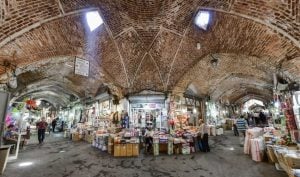
In a significant sign of mounting economic distress, the regular meetings of Iran’s three government branches—now joined by Hamid Pourmohammadi, head of the Planning and Budget Organization—have reignited debate over the country’s deepening economic crisis. Images released from the meeting show Pourmohammadi presenting charts and data to the heads of state, raising suspicions that the regime is increasingly anxious about the economy’s resilience. Economic analysts suggest the meetings are more than symbolic—they represent a last-ditch effort to prepare top decision-makers for the potential collapse of an already strained economic structure. While the roots of the current situation predate the recent regional war, analysts believe that the conflict has pushed the economy into a new phase of crisis.
Iran Escalates Anti-West Rhetoric and Threatens Retaliation as Nuclear Deadline Looms
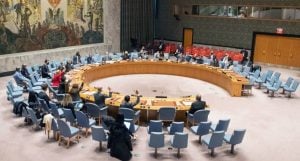
As international pressure intensifies over Iran’s nuclear program, the Iranian regime has adopted a sharply confrontational stance against the West, particularly the United States, signaling a breakdown in diplomacy and a possible return to full-scale confrontation. A new statement from the Iranian Parliament, issued on July 16, reflects Tehran’s hardened position: negotiations, if they occur at all, must now be preceded by strict preconditions.
In its latest declaration, the Iranian Parliament emphasized that “negotiation cannot proceed as before” and that the Islamic Republic must impose “preconditions” before engaging in any new talks. The statement doubled down on the regime’s long-standing slogan “Death to America,” clarifying that it is aimed at U.S. leadership—especially US President Donald Trump and the ruling elite—not the American people.
Khamenei’s War Propaganda and Executions Reveal a Regime in Panic, Not Power
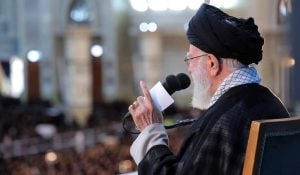
The Iranian regime’s aggressive regional posture and war rhetoric are not rooted in a calculated geopolitical strategy. Rather, they are the desperate tools of a ruling elite scrambling to suppress growing domestic unrest and salvage its eroding legitimacy. For Supreme Leader Ali Khamenei, war has become a propaganda weapon aimed inward, not outward. Following its political and military failures in the recent regional conflict, Tehran has opened new fronts of intervention beyond its borders. But this is not to project strength—it is an attempt to manufacture a state of emergency, contain a volatile society on the brink of explosion, and justify an intensifying wave of domestic repression.
Iran’s Nursing Crisis Deepens: Shortages, Migration, and Systemic Failure Threaten Public Health
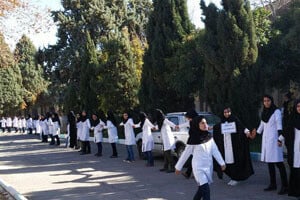
Iran’s healthcare system is spiraling into one of its most serious crises in decades, as a severe shortage of nurses and medical staff threatens both the quality and stability of medical services nationwide. What was once a manageable shortfall has now grown into a systemic emergency—undermining Iran’s ability to provide even basic care in many regions. On July 12, Ahmad Nejatian, head of Iran’s Nursing Organization, revealed that the country is facing a shortage of nearly 100,000 nurses. He added that approximately 5,000 nurses exit the healthcare system every year, citing reasons such as:
- Desire to migrate abroad
- Early retirement
- Severe physical and mental burnout
- Low salaries compared to their workload
Families of Political Prisoners Subjected to Humiliating Searches at Greater Tehran Prison
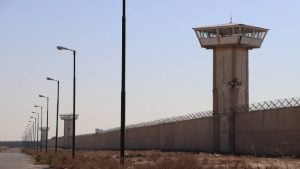
As human rights organizations warn of escalating repression in Iran, reports indicate that families of political prisoners at Greater Tehran Prison were subjected to degrading treatment and unusual body searches during visitations. Some prisoners protested against this conduct. On Thursday, July 17, prison agents in some cases forced family members of political prisoners visiting their loved ones at Greater Tehran Prison to strip completely naked.
Informed sources stated that the visitation process involved aggressive treatment and extensive body searches, which provoked strong protests from the families.
Family of Lennart Monterlos Demands Clarity on His Whereabouts and Reasons for Detention in Iran

The family and friends of Lennart Monterlos, a 19-year-old German-French dual national who has been detained in Iran, issued a statement demanding information about his whereabouts and the reasons for his arrest.
In the statement released on Thursday, July 17, the family and friends of Lennart Monterlos stated that, despite one month having passed since his arrest, they have not received any official information regarding the reasons for his detention or where he is being held.
The Monterlos family emphasized that they are relying on French diplomacy to secure the swift release of their very young son, whom they insist is completely innocent.
They also stated that they are in ongoing contact with the German Foreign Ministry and have called on Iranian regime authorities to recognize their son’s legal rights, including access to an independent Iranian lawyer and consular visitation rights.
Judiciary Under the Microscope of Justice – Part 5
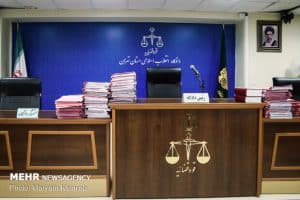
In a regime whose constitution institutionalizes male guardianship over women and whose judiciary is rooted in patriarchal jurisprudence, being a woman is not a privilege—it is a perpetual crime. Since the early days after the 1979 revolution, women—especially political activists, students, writers, and even the mothers and wives of political prisoners—have been subjected to systematic abuse, sexual humiliation, and physical and psychological torture.
The misogynistic laws of the judiciary, combined with corruption and authoritarianism, have criminalized womanhood. Women accused of “illicit relations,” “improper hijab,” or even defending women’s rights have faced:
- Stoning
- Execution, often for allegedly murdering abusive husbands
- Long-term imprisonment for civic activism
Iran Police Chief Radan Discusses Public Unrest and Internal Threats
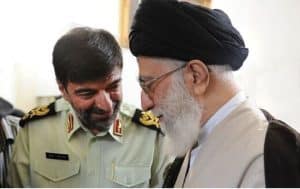
On July 15, 2025, Radan, commander of the Iranian regime’s police force and one of the most important enforcers in Khamenei’s apparatus, gave an interview to the state-affiliated Daneshjoo News Agency. His remarks, laced with threats, deflection, toward the Iranian people, once again revealed the deep anxiety gripping the regime of the Supreme Leader. Far from projecting strength, Radan’s statements reflected the regime’s inability to contain the growing anger simmering across society—an anger that signals the nearness of the regime’s collapse.
In the interview, Radan, commander of Iran’s police force, stated that “spies and traitors are under close surveillance, and the remaining ones will soon be dealt with.” He emphasized the importance of national security and monitoring internal threats. While officials often attribute leaks of sensitive information to foreign interference, some analysts and critics suggest that internal corruption and factional rivalries within state institutions—such as the Islamic Revolutionary Guard Corps (IRGC) and the Ministry of Intelligence—may also play a role in such breaches.
Supporters of the Iranian Resistance Hold Awareness Event on Utøya Against Executions in Iran
On July 17, 2025, members of the Young Norwegian-Iranians for Democracy (UNID)—supporters of the Iranian Resistance—held an awareness event on the island of Utøya, Norway. The event aimed to highlight the Iranian regime’s escalating use of executions and brutal repression to silence dissent. Organized with the support of Socialist Youth (Sosialistisk Ungdom), the event featured an information stand and a photo exhibition to raise public awareness among Norwegians.
Supporters of the #IranianResistance Hold Awareness Event on Utøya Against Executions in #Iran #StopExecutionsInIran #FreePoliticalPrisoners https://t.co/FPfMaREzNJ
— Iran Freedom (@4FreedominIran) July 18, 2025
Among the images displayed were those of Saeed Masouri—one of Iran’s longest-imprisoned political prisoners and a steadfast supporter of the People’s Mojahedin Organization of Iran (PMOI/MEK). His fate remains unknown after Iranian security forces violently stormed Ghezel Hesar Prison on July 16, 2025, in a brutal assault believed to have targeted him. Also displayed were photos of political prisoners Mehdi Hassani and Behrouz Ehsani, both sentenced to death and at serious risk of imminent execution, alongside many other prisoners facing similar threats.
Paris Exhibition Reveals Iran Regime’s Plot to Massacre Political Prisoners, Urges Global Action
Paris, France – July 16-17, 2025 – Supporters of the People’s Mojahedin Organization of Iran (PMOI/MEK) organized an exhibition to denounce the Iranian regime’s escalating human rights violations, with a particular focus on the grave threat facing political prisoners. According to recent reports, including the case of political prisoner Saeed Masouri, the clerical regime has orchestrated a plot to carry out a large-scale massacre of political prisoners, aiming to silence dissent through mass executions. The exhibition issued an urgent international appeal, calling on human rights organizations, the United Nations, and democratic governments worldwide to take immediate action to stop this planned atrocity and prevent a humanitarian catastrophe.
Also, read Iran News in Brief – July 18, 2025